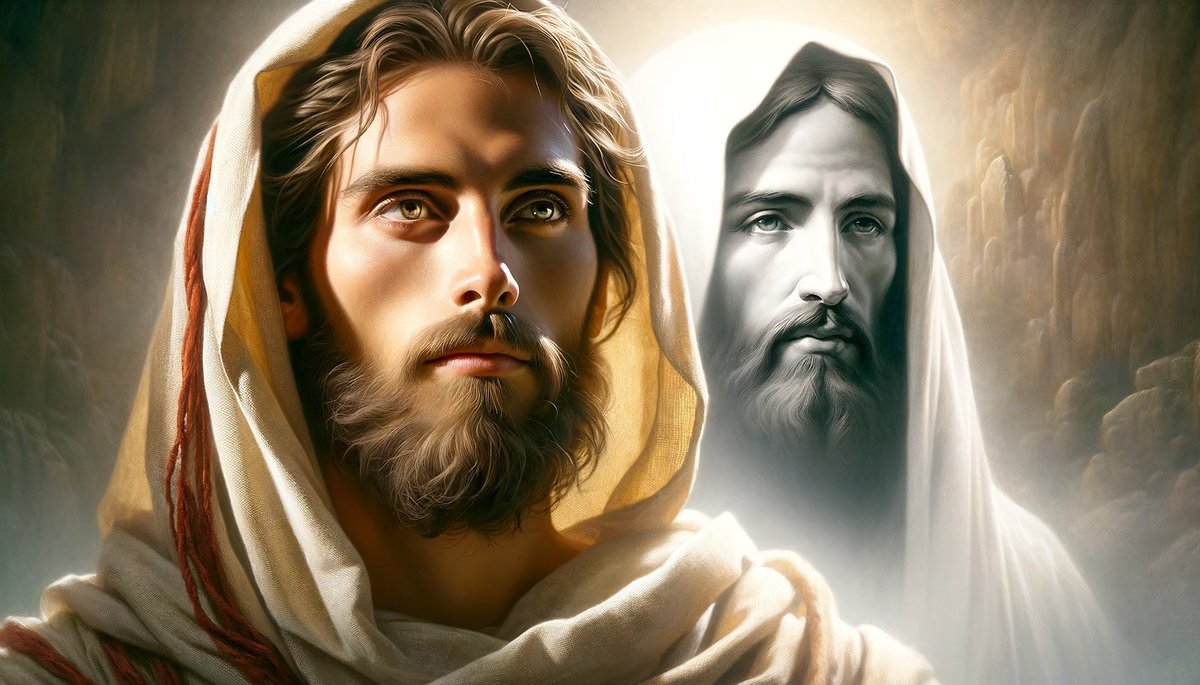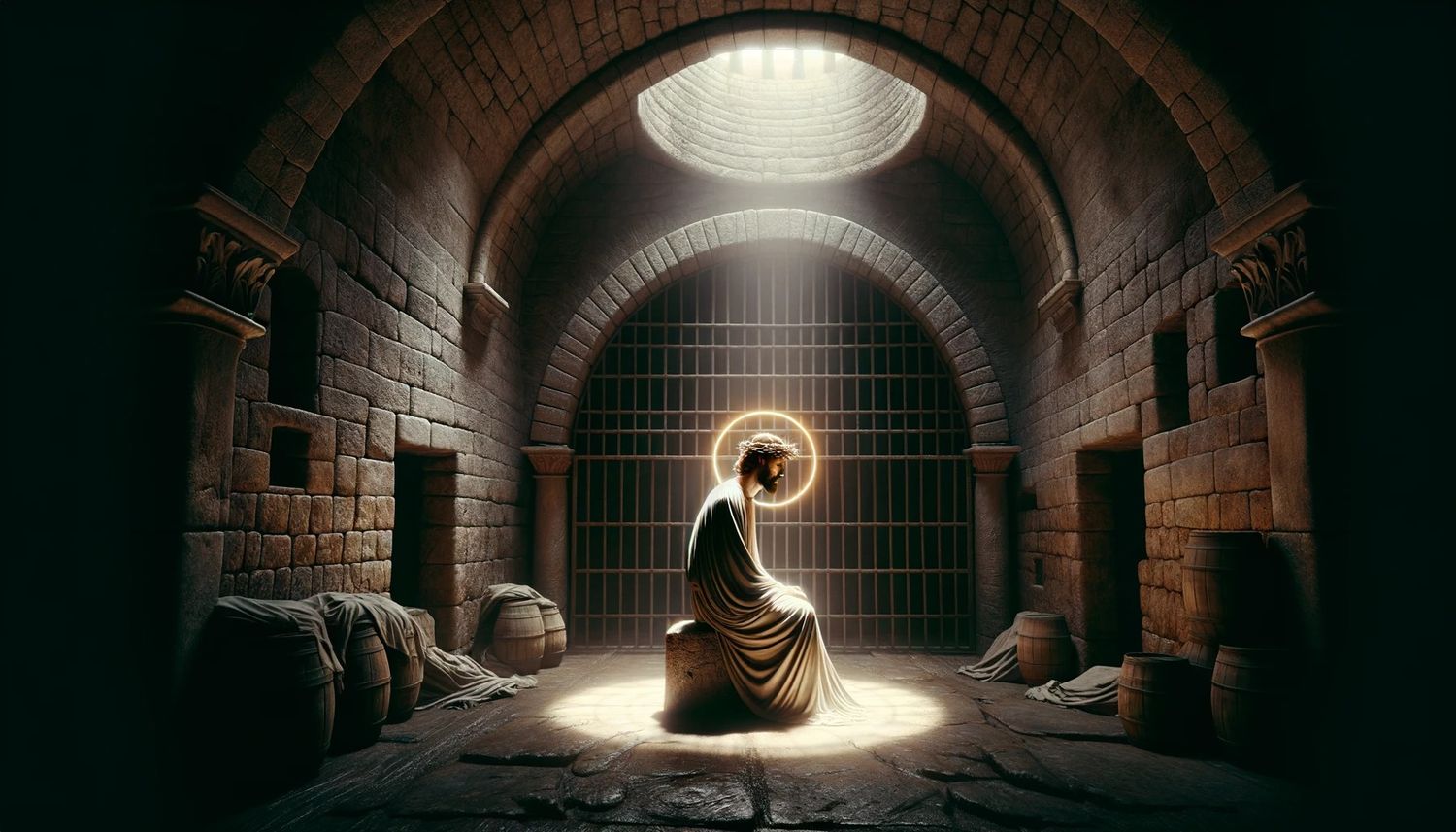Home>Theology and Spirituality>How Did John The Baptist Prepare For The Messiah Jesus Christ


Theology and Spirituality
How Did John The Baptist Prepare For The Messiah Jesus Christ
Published: February 24, 2024
Peter Smith, Editorial Director at Christian.net, combines deep insights into faith, politics, and culture to lead content creation that resonates widely. Awarded for his contributions to religious discourse, he previously headed a major organization for religious communicators, enhancing dialogue on faith's societal impacts.
Discover how John the Baptist prepared for the Messiah, Jesus Christ, and the theological significance of his role in theology and spirituality. Explore the profound impact of John's ministry and his connection to the coming of Christ.
(Many of the links in this article redirect to a specific reviewed product. Your purchase of these products through affiliate links helps to generate commission for Christian.net, at no extra cost. Learn more)
Table of Contents
Introduction
The story of John the Baptist is a compelling and pivotal aspect of the Christian faith. His life and ministry serve as a prelude to the arrival of Jesus Christ, the central figure in Christianity. John's role as the forerunner of Christ is a testament to the divine plan and the interconnectedness of the Old and New Testaments. Understanding how John the Baptist prepared the way for the Messiah Jesus Christ provides profound insights into the spiritual significance of his actions and teachings.
John the Baptist's life and mission are shrouded in mystery and wonder, evoking a sense of anticipation and reverence. His birth, prophesied by the angel Gabriel, was miraculous, as his parents, Zechariah and Elizabeth, were advanced in years and had been unable to conceive. This divine intervention signaled the extraordinary purpose that awaited John, setting the stage for his future role in preparing the hearts of the people for the coming of the Savior.
As we delve into the narrative of John the Baptist, we are invited to explore the profound spiritual implications of his ministry. His unwavering commitment to his calling, coupled with his ascetic lifestyle and powerful preaching, captivates the imagination and stirs the soul. Through his words and actions, John exemplified the essence of repentance and spiritual renewal, igniting a fervent longing for the arrival of the long-awaited Messiah.
The timeless relevance of John the Baptist's story extends beyond historical chronicles; it resonates with the core tenets of faith, hope, and redemption. His proclamation of repentance and the imminent arrival of the Messiah reverberates through the corridors of time, beckoning humanity to embrace a transformative encounter with the divine. As we embark on this exploration of John the Baptist's pivotal role in preparing the way for Jesus Christ, we are poised to uncover profound truths that continue to shape the spiritual landscape of believers worldwide.
The stage is set, the anticipation palpable, and the echoes of John's resounding message reverberate through the ages, beckoning us to embark on a journey of discovery and enlightenment. Let us embark on this enlightening expedition, delving into the life and ministry of John the Baptist, as we unravel the profound significance of his preparation for the advent of the Messiah Jesus Christ.
John the Baptist's Background and Calling
John the Baptist's background and calling are steeped in divine providence and purpose. His birth, foretold by the angel Gabriel to his father, Zechariah, and his mother, Elizabeth, was a miraculous event that signaled the unfolding of a profound destiny. Born into a devout Jewish family, John's lineage can be traced to the priestly lineage of Aaron, further underscoring the significance of his calling within the religious context of the time.
From his earliest days, John was set apart for a unique purpose, as evidenced by the divine mandate that he would be filled with the Holy Spirit even from his mother's womb. This extraordinary anointing foreshadowed his future role as the herald of the Messiah, imbuing him with a deep spiritual sensitivity and a fervent devotion to God's will.
John's upbringing in the wilderness of Judea, away from the trappings of urban life, instilled in him a profound connection to the natural world and a deep sense of contemplation. His ascetic lifestyle, characterized by simplicity and self-discipline, prepared him for the austere mission that lay ahead. As he matured, John's solitary existence in the wilderness cultivated a profound intimacy with the divine, shaping his character and fortifying his resolve to fulfill his divine calling.
The prophetic mantle that enveloped John's life became unmistakably evident as he emerged onto the public stage, clad in a garment of camel's hair with a leather belt around his waist, reminiscent of the ancient prophets of Israel. His striking appearance, coupled with his unwavering proclamation of repentance and the imminent arrival of the Messiah, captivated the hearts and minds of those who encountered him.
John's calling as the forerunner of Christ was not merely a product of his lineage or upbringing; it was a divine ordination that transcended human understanding. His very existence was intricately woven into the tapestry of God's redemptive plan, serving as a bridge between the prophetic promises of old and the fulfillment embodied in Jesus Christ.
As we contemplate the background and calling of John the Baptist, we are confronted with the awe-inspiring realization that his life was intricately intertwined with the unfolding drama of salvation history. His birth, upbringing, and prophetic vocation converge to form a narrative that transcends the boundaries of time, inviting us to ponder the mysterious ways in which God orchestrates the destinies of His chosen vessels.
In the next section, we will delve deeper into John's message and ministry, unraveling the profound impact of his proclamation of repentance and spiritual renewal.
John's Message and Ministry
John the Baptist's message and ministry were characterized by a fervent call to repentance and a profound anticipation of the imminent arrival of the Messiah. His proclamation echoed across the Judean wilderness, drawing multitudes from Jerusalem, Judea, and the region beyond the Jordan to heed his compelling exhortations.
At the heart of John's message lay the clarion call to repentance, urging the people to turn away from their sinful ways and embrace a life of spiritual renewal. His impassioned plea resonated with a sense of urgency, compelling individuals to confront their moral failings and embark on a transformative journey of inner purification. Through his powerful rhetoric and uncompromising stance, John exhorted the people to prepare their hearts for the coming of the long-awaited Messiah.
Central to John's ministry was the act of baptism, symbolizing a profound commitment to repentance and spiritual cleansing. The ritual immersion in the waters of the Jordan River signified a symbolic washing away of sins and a decisive break from past transgressions. As individuals submitted to the rite of baptism, they publicly acknowledged their need for spiritual transformation and their readiness to embrace a renewed way of life.
John's ministry transcended mere ritualistic practices; it penetrated the depths of the human soul, stirring a collective longing for redemption and restoration. His unwavering dedication to his divine mandate and his uncompromising stance against religious hypocrisy and moral complacency set the stage for a profound spiritual awakening among the people.
The impact of John's message reverberated far and wide, transcending social barriers and resonating with individuals from all walks of life. His bold confrontation of the religious elite and his impassioned plea for genuine repentance challenged the prevailing religious norms, igniting a fervent desire for authentic spiritual revival.
As we reflect on John the Baptist's message and ministry, we are confronted with the timeless relevance of his call to repentance and spiritual renewal. His unwavering commitment to truth and righteousness serves as a poignant reminder of the transformative power of genuine repentance and the profound implications of preparing the way for the Messiah.
In the subsequent section, we will delve into the pivotal role of baptism and repentance in John's preparation for the advent of Jesus Christ, unraveling the profound spiritual significance of these foundational elements in his ministry.
Baptism and Repentance
Baptism and repentance were central themes in John the Baptist's ministry, embodying the essence of spiritual renewal and preparation for the arrival of the Messiah. The act of baptism, symbolized by immersion in the waters of the Jordan River, held profound significance as a public declaration of repentance and a commitment to embark on a new spiritual journey.
The ritual of baptism, as administered by John, represented a transformative experience, signifying a decisive break from past transgressions and a symbolic cleansing of the soul. Individuals who sought baptism willingly embraced a profound acknowledgment of their need for inner purification and their desire to align their lives with the divine will. The immersion in the waters of the Jordan River served as a powerful symbol of spiritual rebirth, marking a pivotal moment of transition from a life characterized by sin and spiritual apathy to one defined by righteousness and renewed purpose.
Repentance, intricately intertwined with the sacrament of baptism, formed the bedrock of John's message and ministry. His impassioned call for repentance reverberated with urgency, compelling individuals to confront their moral failings and turn away from their sinful ways. The profound gravity of repentance lay in its capacity to engender a radical transformation of the heart, prompting individuals to realign their priorities and embrace a life characterized by genuine contrition and moral uprightness.
The synergy between baptism and repentance underscored the transformative power of John's ministry, igniting a fervent longing for spiritual renewal among the people. The act of baptism, coupled with the sincere commitment to repentance, served as a catalyst for inner metamorphosis, fostering a deep sense of spiritual awakening and a renewed dedication to living in accordance with God's precepts.
As we contemplate the profound interplay between baptism and repentance in the context of John the Baptist's ministry, we are confronted with the enduring relevance of these foundational principles in the spiritual landscape of humanity. The timeless significance of baptism as a symbol of spiritual rebirth and repentance as a catalyst for inner transformation continues to resonate with believers, underscoring the profound implications of preparing the way for the advent of Jesus Christ.
In the subsequent section, we will delve into the pivotal role of John the Baptist in preparing the way for Jesus Christ, unraveling the profound spiritual significance of his prophetic ministry and its enduring impact on the fabric of Christian faith.
Preparing the Way for Jesus Christ
John the Baptist's pivotal role in preparing the way for Jesus Christ transcends the boundaries of time and resonates with profound spiritual significance. As the forerunner of the Messiah, John's ministry served as a transformative catalyst, igniting a fervent anticipation of the imminent arrival of the Savior.
At the heart of John's mission lay the prophetic fulfillment of Isaiah's ancient proclamation, "A voice of one calling: 'In the wilderness prepare the way for the Lord; make straight in the desert a highway for our God.'" (Isaiah 40:3, NIV) This profound declaration encapsulated the essence of John's divine mandate – to pave the way for the coming of the long-awaited Messiah, heralding a message of repentance and spiritual renewal.
John's unwavering commitment to his prophetic calling reverberated across the Judean wilderness, drawing multitudes who were captivated by his impassioned plea for repentance and his proclamation of the impending arrival of the Messiah. His austere lifestyle and compelling rhetoric captured the hearts of the people, stirring a collective longing for the fulfillment of God's redemptive promises.
The baptism administered by John symbolized a profound commitment to spiritual purification and a decisive break from the bondage of sin, preparing the hearts of the people to receive the transformative message of Jesus Christ. The act of baptism, coupled with the call to repentance, laid the groundwork for a spiritual awakening that would culminate in the ministry of the Messiah.
John's proclamation of the coming Messiah transcended the confines of religious formalism, challenging the prevailing norms and beckoning the people to embrace a genuine encounter with the divine. His resounding message of repentance and the imminent arrival of the Savior kindled a fervent anticipation that would find its fulfillment in the person of Jesus Christ.
As the harbinger of the Messiah, John the Baptist's ministry serves as a timeless testament to the interconnectedness of divine prophecy and fulfillment. His unwavering dedication to preparing the hearts of the people for the advent of Jesus Christ underscores the profound significance of his role in the grand narrative of salvation history.
In the annals of Christian faith, John the Baptist's legacy endures as a beacon of hope and anticipation, embodying the essence of spiritual preparation and the profound longing for the redemptive work of the Messiah. His proclamation reverberates through the corridors of time, beckoning humanity to embrace a transformative encounter with the Savior, Jesus Christ.
Conclusion
In conclusion, the profound narrative of John the Baptist's preparation for the Messiah Jesus Christ unveils a tapestry of divine providence, spiritual significance, and timeless relevance. From his miraculous birth and prophetic calling to his unwavering proclamation of repentance and the imminent arrival of the Savior, John the Baptist emerges as a central figure in the grand drama of salvation history.
The backdrop of John's ascetic upbringing in the wilderness, his striking appearance reminiscent of the ancient prophets, and his fervent call to repentance converge to form a narrative that transcends the boundaries of time. His ministry, characterized by the transformative sacrament of baptism and the resounding message of spiritual renewal, serves as a poignant reminder of the enduring power of genuine repentance and the profound implications of preparing the way for the Messiah.
The synergy between John's prophetic ministry and the fulfillment embodied in Jesus Christ underscores the interconnectedness of divine prophecy and fulfillment. His role as the forerunner of the Messiah exemplifies the intricate orchestration of God's redemptive plan, inviting humanity to embrace a transformative encounter with the Savior.
As we reflect on the profound legacy of John the Baptist, his life and ministry continue to resonate with believers worldwide, inspiring a fervent longing for spiritual renewal and a deepened anticipation of the redemptive work of Jesus Christ. His proclamation of repentance and the imminent arrival of the Messiah transcends the confines of historical chronicles, beckoning humanity to embrace a transformative encounter with the divine.
In the annals of Christian faith, John the Baptist's enduring legacy serves as a beacon of hope and anticipation, embodying the essence of spiritual preparation and the profound longing for the redemptive work of the Messiah. His resounding message reverberates through the corridors of time, inviting us to embark on a journey of discovery and enlightenment, as we unravel the profound significance of his preparation for the advent of Jesus Christ.














